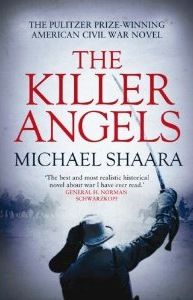In a relatively extensive library - if I may say so (for my age) - until recently only one book on the American Civil War could be found, a rather prosaic work with lots of illustrations by Philip Katcher. That has changed now.
That has changed, since Katcher has now been joined by Shaara, more precisely by the latter's Pulitzer Prize-winning
The Killer Angels.

The one book I already had was despite its many color plates and maps not very conductive to read - by contrast Shaara's The Killer Angels is a bombshell. It's an easy read in flowing prose, very difficult to lay down. I suspect much if not all of its readability has to do with its concept. Yes, it's a fictionalized historical novel - fictionalized in the way that the author has 'invented' its main characters' thoughts and verbal communication.
I am still reading the book - I have reached the point where Colonel Chamberlain of the 20th Maine Regiment, out of lack of ammo, decides on a bayonet charge down Little Round Top with the 'hinge' being his connection to 83rd Pennsylvania. Shaara cannot possibly have known what Chamberlain ordered his men verbatim - but it's clear he did massive research on what happened on that fateful day in July 1863 and what he puts in the Colonel's mouth (and mind) may be as close an approximation of the reality as you can get. I have encountered this style of history writing only once before, many years ago, in Rolf Palm's
The Bridge at Remagen, and I recall I was smitten by it. And now it's happening again. Shaara brings the American Civil War back to life with an historical novel that's only fictionalized where it concerns the deeper psychology and the exact words and thoughts of its protagonists - but I bet there's few 'genuine', 'serious' history books that feed you so much hard data in such a limited volume: The Killer Angels is no large book. Irresistibly, the novel takes you by the hand and lets you accompany Union Brigadier General John Buford on a sweltering July evening in 1863 towards dusk and a sleepy town by the name of Gettysburg. You are present when Buford, upon noticing Confederate Infantry milling around on a road entering said town from the east, decides to deploy his two infantry brigades across that road, anticipating the small forces he saw are just the vanguard of General Lee's entire Army of Northern Virginia.
You are looking over Colonel Chamberlain's shoulder when his 20th Maine Regiment (rather, what's left of it) is suddenly burdened by the arrival of 120 mutineers from 2nd Maine - and how he deals with that situation. Effectively, by the way.
And on the eve of the battle you are watching from under a tree as Confederate General Longstreet observes his staff laughing, cajoling and playing poker, without Longstreet himself participating, because he has lost all joy in such merrymaking since the death of three of his children.
Jesus, why bother you any longer -
JUST BUY IT!
It's
DYNAMITE!!!
MFBB.
PS: question for any American Civil War buff: in the book, it is hinted that the South fought at least as much for greater autonomy for the States as for maintaining slavery. In other words, the South did not want a too powerful Central Government. It's what Shaara puts in the mouths and minds of several southern characters. What do you think of that? Is Shaar a closet, or not so closet, adept of the Lost Cause?
